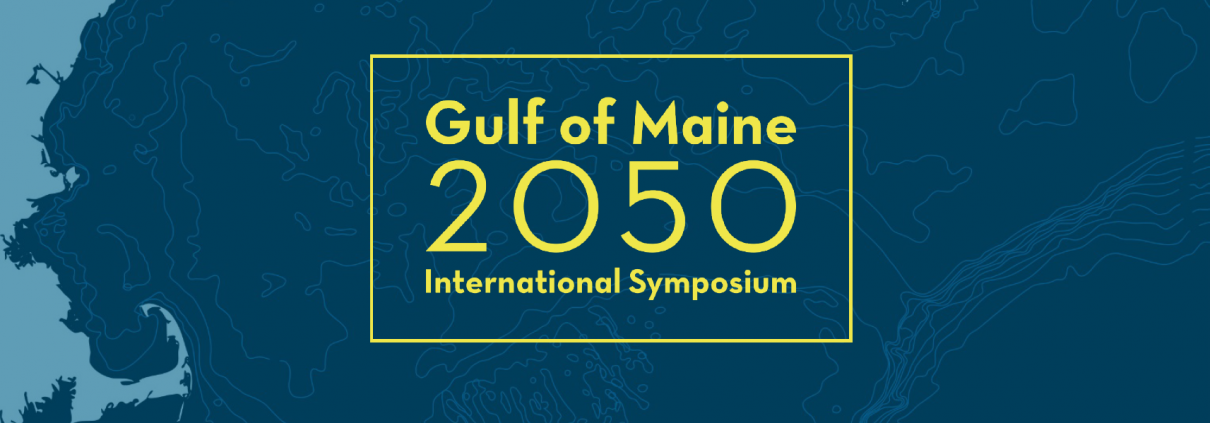MIT Sea Grant Joins Hundreds of Leaders and Scientists Focusing on the Future of the Gulf of Maine
Scientists, planners, and leaders – largely from New England and the Maritime Provinces (New Brunswick, Nova Scotia, and Prince Edward Island) have convened in Portland for the Gulf of Maine 2050 International Symposium November 4-8, 2019. MIT Sea Grant joins hundreds of environmental, economic, social, and institutional perspectives working towards a collaborative 30-year climate resiliency plan for the Gulf of Maine.
Hosted by the Gulf of Maine Research Institute, the Gulf of Maine Council on the Marine Environment, and the Huntsman Marine Science Centre, the symposium includes three thematic days: Sea Level Rise and Precipitation; Ocean Acidification; and Warming Waters. MIT Sea Grant Research Scientist Carolina Bastidas and Council Member Judith Pederson provided support in planning. Bastidas noted the challenge of dividing the presentations and panels by themed topics, given the interconnected nature of climate research, challenges, and potential solutions.
DAY 1: SETTING THE STAGE
The Governor of Maine, Honorable Janet T. Mills, delivered opening remarks and announced plans to reduce the state’s greenhouse gas emissions by 80 percent from 1990 levels by 2050. Several speakers then set the stage on global drivers, policy, and changing conditions in the region, followed by a Celebration of the Gulf of Maine, an immersive presentation by MIT Sea Grant visiting artist Keith Ellenbogen. Wrapping up the first day, the conservation photographer shared captivating underwater images of the diverse species that call these waters home.
Image by MIT Sea Grant visiting artist conservation photographer Keith Ellenbogen. Consumed worldwide, mackerel also act as an important food fish for many other species of fish and marine mammals in the Gulf of Maine. Ellenbogen’s three-year project Space to Sea explores the Stellwagen Bank Marine Sanctuary ecosystem, funded by a National Marine Sanctuary Foundation Ernest F. Hollings Ocean Awareness Award.
DAY 2: SEA LEVEL RISE AND PRECIPITATION
On the second day, the symposium delved into climate trends and impacts, storms and long-term weather patterns, effects of sea level rise on coastal ecosystems, and adaptation solutions. Attendees broke into working groups to foster development of shared priorities and strategies among stakeholders, and explored cutting-edge research through a dynamic poster session. In this poster session, MIT Sea Grant Social Scientist Lindsey Williams presented her work, Building resilience by rethinking research and engagement: Lessons from conflicts over science. Over 30 additional research topics ranged from living shoreline approaches with the Massachusetts Office of Coastal Zone Management, to high-resolution continuous bathymetry with the US Geological Survey.
DAY 3: OCEAN ACIDIFICATION
Shifting the focus to ocean acidification, the symposium presents current data and anticipated impacts on the Gulf of Maine projected for the next 30 years. Early in the day, Sam Siedlecki from the University of Connecticut presents a scenario paper on the Gulf of Maine expected conditions in ocean and coastal acidification by 2050 (downloadable here). Bastidas was a contributor to this scenario paper, particularly on the biological effects on upcoming conditions for fisheries and aquaculture resources. On this morning, Hessam Babaee from the University of Pittsburgh also presents on a collaborative research project within MIT Sea Grant, A Multi-Fidelity Framework and Uncertainty Quantification for Ocean Acidification in the Massachusetts and Cape Cod Bays.
Later in the day, during the panel Promoting Coastal and Ocean Resiliency – Challenges, Current Efforts, and Future Opportunities, Parker Gassett from the University of Maine and Matt Liebman from EPA Region 1, discuss water quality and Shell Day. Shell Day is an ocean acidification monitoring blitz of 2019 that MIT Sea Grant, together with Woods Hole Sea Grant, were instrumental to implementing in MA, this August, together with many other partners across the New England region.
DAY 4: WARMING WATERS
Heating up on day four, Michelle Staudinger with the US Department of Interior Northeast Climate Adaptation Science Center introduces anticipated impacts of warming temperatures in the Gulf of Maine over the next several decades. Several speakers highlight impacted species, including seabirds, the North Atlantic right whale, and commercial fish and lobster. Working group sessions focus on gap analysis to determine preparedness for future warming conditions, and identify top research, policy, and management priorities moving forward.
Together, we will learn how the Gulf of Maine is expected to change in the next 30 years, build a shared vision for regional resilience, and activate new collaborations for action. (www.gulfofmaine2050.org)
- Visit www.gulfofmaine2050.org.
- View the GOM2050 program schedule and abstract booklet.
- Read more about the symposium via the Press Herald here.





